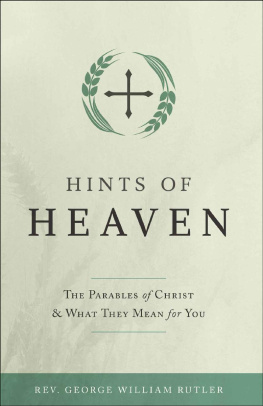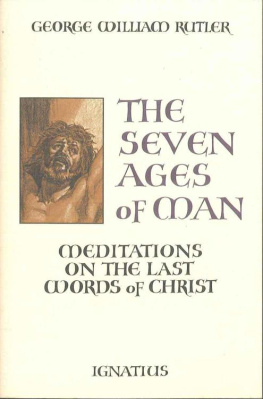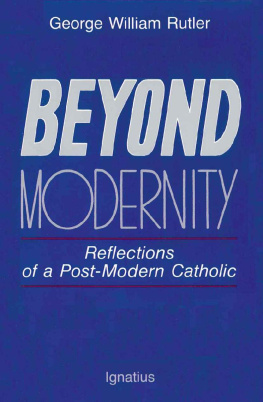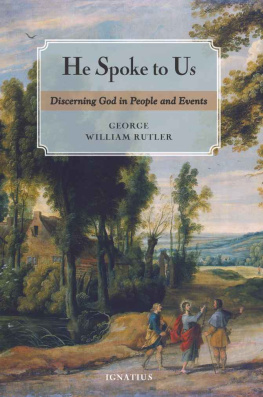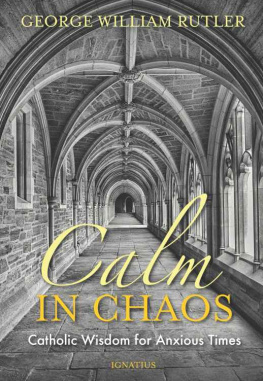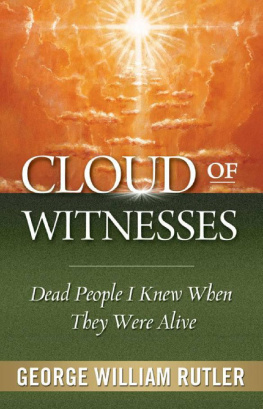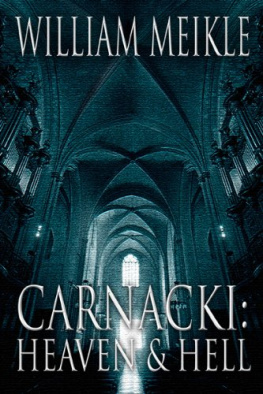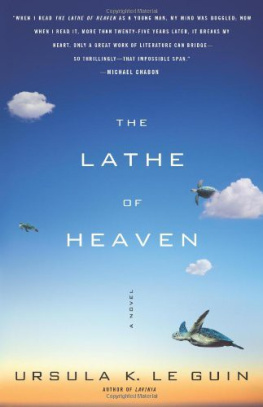Fr. George William Rutler - Hints of Heaven
Here you can read online Fr. George William Rutler - Hints of Heaven full text of the book (entire story) in english for free. Download pdf and epub, get meaning, cover and reviews about this ebook. year: 2015, publisher: Sophia Institute Press, genre: Detective and thriller. Description of the work, (preface) as well as reviews are available. Best literature library LitArk.com created for fans of good reading and offers a wide selection of genres:
Romance novel
Science fiction
Adventure
Detective
Science
History
Home and family
Prose
Art
Politics
Computer
Non-fiction
Religion
Business
Children
Humor
Choose a favorite category and find really read worthwhile books. Enjoy immersion in the world of imagination, feel the emotions of the characters or learn something new for yourself, make an fascinating discovery.
- Book:Hints of Heaven
- Author:
- Publisher:Sophia Institute Press
- Genre:
- Year:2015
- Rating:3 / 5
- Favourites:Add to favourites
- Your mark:
- 60
- 1
- 2
- 3
- 4
- 5
Hints of Heaven: summary, description and annotation
We offer to read an annotation, description, summary or preface (depends on what the author of the book "Hints of Heaven" wrote himself). If you haven't found the necessary information about the book — write in the comments, we will try to find it.
Hints of Heaven — read online for free the complete book (whole text) full work
Below is the text of the book, divided by pages. System saving the place of the last page read, allows you to conveniently read the book "Hints of Heaven" online for free, without having to search again every time where you left off. Put a bookmark, and you can go to the page where you finished reading at any time.
Font size:
Interval:
Bookmark:
George William Rutler
Hints of Heaven
The Parables of Christ and
What They Mean for You
SOPHIA INSTITUTE PRESS
Manchester, New Hampshire
Copyright 2014 by George William Rutler
Printed in the United States of America
All rights reserved
Cover design by Coronation Media in collaboration with Perceptions Design Studio.
Biblical references in this book are taken from the Catholic Edition of the Revised Standard Version of the Bible, copyright 1965, 1966 by the Division of Christian Education of the National Council of the Churches of Christ in the United States of America. Used by permission. All rights reserved.
No part of this book may be reproduced, stored in a retrieval system, or transmitted in any form, or by any means, electronic, mechanical, photocopying, or otherwise, without the prior written permission of the publisher, except by a reviewer, who may quote brief passages in a review.
Sophia Institute Press
Box 5284, Manchester, NH 03108
1-800-888-9344
www.SophiaInstitute.com
Sophia Institute Press is a registered trademark of Sophia Institute.
Library of Congress Cataloging-in-Publication Data
Rutler, George W. (George William)
Hints of heaven : the parables of Christ and what they mean for you / George William Rutler.
pages cm
Includes bibliographical references.
ISBN 978-1-62282-232-4 (pbk. : alk. paper) ePub ISBN 978-1-622822-331 1. Jesus Christ Parables. I. Title.
BT375.3.R88 2015
226.8'06 dc23
2014039785
To the memory of John Macquarrie,
Lady Margaret Professor of Divinity
in the University of Oxford
Contents
Introduction:
Introduction
Seeing, but Not Seeing
The kingdom of heaven is like treasure hidden in a field.... There was a householder who planted a vineyard.... The land of a rich man brought forth plentifully.... There was a rich man who had a steward, and charges were brought to him that this man was wasting his goods.... A man was going down from Jerusalem to Jericho....
These familiar lines open the most exquisitely austere and natural of all stories, the parables told by the Word who uttered the world into existence. The only proof I have of their literary superiority is that no one has ever been able to match them. Those who try are like a man standing before a masterpiece of painting who says, I can do that, takes up a palette, and produces a greeting card.
A parable, to be pedantic, is a similitude employing a brief narrative in order to teach a spiritual lesson. In the case of Jesus, however, this definition is as unhelpful as it is accurate. Johns Gospel has no parables, although it abounds in metaphors, but the three Synoptic writers, Matthew, Mark, and Luke, weave them in and out of the historical record, sometimes duplicating and even triplicating them. Depending on how one identifies a distinct parable, the number varies, but traditional listings name twenty-four in the Gospels.
I am aware that no man can match the Man who spoke the parables, and so to reflect on them requires a more profound consideration and a deeper decibel than commentary on ordinary literature. There are, however, two very serious, if not original, points to remember before embarking on even the briefest glimpses of these texts:
First, the parables of Christ are unlike other Eastern parables and the lesser stuff to be found in current spiritual best sellers in that they are not exotic. They do not distort or exaggerate nature in the way fables do. Kings are kings but not wizards, and rich men are rich but not omnipotent. The Good Samaritan carries the poor man to an inn; he does not fly him there on a carpet. The pearl of great price is valuable, but it is nothing more than a pearl. Jewish realism permits no such exoticism in the Old Testament, which contains five parables at most, depending on how one applies mishna , the Hebrew word for story telling.
Second, the parables really are what Jesus said they are: hints of heaven. Because the glory of heaven is too great for us to bear just now, Christ uses parables as delicate and veiled indications of our true homeland. Every culture has to some extent sensed that the glory of heaven is too bright for our eyes. The ancient Egyptians kept a veiled image of Maat, the goddess of Truth, in their temple at Sas, believing that the actual sight of it would blind or even kill the viewer. The entire audience on the mount would have fled if Christ had plainly stated in His sermon that His kingdom was of another world. He saved that declaration for Pontius Pilate, who only shook his cynical head.
Anything I say about the parables of Christ has this advantage over the perceptions of His original audience: the Resurrection is now a known reality, and the Temple veil has been torn open. And yet we are still unprepared for the weight of glory: This is why I speak to them in parables, because seeing they do not see, and hearing they do not hear, nor do they understand.
Understanding Christs parables belongs to the childlike. The humble of heart recognize the lessons of the parables as they play out in the course of history. They surface in both the mistakes and the courage of the Crusaders, in both the glorious architecture and the inhuman tortures of the High Middle Ages, in the zealous missionaries and the haughty degenerates of the Counter-Reformation, and in the witness of the martyrs at the hands of the maniacs of the twentieth century.
The parabolic treasure is hidden in the concrete of Wall Street as truly as in a Galilean pasture. Every culture, advanced or backward, can understand a parable, because it offers a universally sought pearl. Mr. Caveman would have nodded some form of assent, as would the French heirs to Louis IX and Louis Pasteur and the English scions of St. Thomas More and Samuel Johnson.
Parables are often dismissed as too simple: Because a child can understand them, adults must yawn through them. And yet Christ spoke in parables. That fact is infinitely interesting and eternally salvific. In the face of worldly-wise criticism, one recalls the story of the tourist in Florence who sniffed that he was not all that impressed with the Uffizis collection. A guard, heir to an ancient mandate to care for these treasures, replied in halting but intelligible English, Here we do not judge the pictures; the pictures judge us.
This point was lost on many of those who first heard Christs parables, and Divine Providence permits us to view their example as a cautionary icon of confused pride: When the chief priests and the Pharisees heard his parables, they perceived that he was speaking about them. But when they tried to arrest him, they feared the multitudes, because they held him to be a prophet.
In their perverse pride, they would arrest a man for being arresting and would crucify Him for being a king. But in another world that is not so, and of this world the parables speak.
GWR
Matt. 13:13. Matt. 25:4546.One
The Sower and the Seed
A sower went out to sow his seed; and as he sowed, some fell along the path, and was trodden under foot, and the birds of the air devoured it. And some fell on the rock; and as it grew up, it withered away, because it had no moisture. And some fell among thorns; and the thorns grew with it and choked it. And some fell into good soil and grew, and yielded a hundredfold. As he said this, he called out, He who has ears to hear, let him hear. And when his disciples asked him what this parable meant, he said, To you it has been given to know the secrets of the kingdom of God; but for others they are in parables, so that seeing they may not see, and hearing they may not understand. Now the parable is this: The seed is the word of God. The ones along the path are those who have heard; then the devil comes and takes away the word from their hearts, that they may not believe and be saved. And the ones on the rock are those who, when they hear the word, receive it with joy; but these have no root, they believe for a while and in time of temptation fall away. And as for what fell among the thorns, they are those who hear, but as they go on their way they are choked by the cares and riches and pleasures of life, and their fruit does not mature. And as for that in the good soil, they are those who, hearing the word, hold it fast in an honest and good heart, and bring forth fruit with patience. Luke 8:515.Next pageFont size:
Interval:
Bookmark:
Similar books «Hints of Heaven»
Look at similar books to Hints of Heaven. We have selected literature similar in name and meaning in the hope of providing readers with more options to find new, interesting, not yet read works.
Discussion, reviews of the book Hints of Heaven and just readers' own opinions. Leave your comments, write what you think about the work, its meaning or the main characters. Specify what exactly you liked and what you didn't like, and why you think so.

